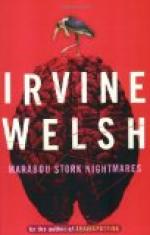|
This section contains 941 words (approx. 4 pages at 300 words per page) |

|
SOURCE: A review of Marabou Stork Nightmares, in American Journal of Psychiatry, Vol. 153, No. 12, December, 1996, pp. 1641–42.
In the following positive review of Marabou Stork Nightmares, Merikangas compares Welsh to Thomas De Quincey, William Burroughs, Hunter Thompson, George Orwell, and James Kelman, asserting that each of these authors offer readers insight into the psychology of drug use without the dangers of the actual experience.
“Ecstasy” is defined as “intense joy or delight. A state of emotions so intense that one is carried beyond rational thought and self control” (The American Heritage Dictionary). The word is derived from the Greek ekstasis, meaning “astonishment, distraction.” It is a synonym for “rapture,” which comes from the old French meaning of “carrying off.” But ecstasy is also MDMA (3,4-methylenedioxymethamphetamine), an easily synthesized recreational drug of abuse that increases both dopaminergic and serotonergic function. It produces a longer lasting high than cocaine. This drug...
|
This section contains 941 words (approx. 4 pages at 300 words per page) |

|


